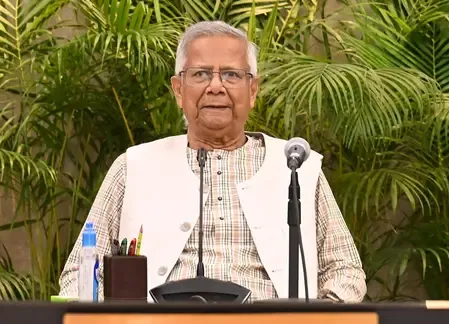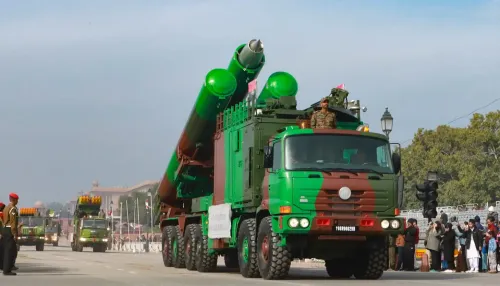Is Bangladesh Aligning with Turkey Against India?

Synopsis
Key Takeaways
- Bangladesh is forging stronger ties with Turkey.
- ISI's influence is rising in Bangladesh.
- Turkey is supplying military equipment to Bangladesh.
- Radical groups in Bangladesh are gaining strength.
- This alliance poses a potential threat to India.
New Delhi, Sep 29 (NationPress) Amidst the upheaval following the Sheikh Hasina government’s collapse, Bangladesh is strengthening its ties with Turkey. This alliance is being facilitated by Pakistan's ISI as part of a strategy to engage the South Asian Muslim community.
The Jamaat-e-Islami, under the influence of the ISI, urged the Muhammad Yunus government to forge a deeper connection with Turkey. This is aimed at establishing a flow of funding, arms, and ammunition from Turkey into Bangladesh.
According to Indian intelligence, Bangladesh has emerged as the fourth-largest importer of Turkish weapons. This development raises concerns, as these arms could potentially be directed against India—a scenario that Jamaat and ISI have been orchestrating. While India possesses the means to counter such threats, the challenge lies in addressing this emerging issue.
Historically, the relationship between India and Bangladesh was robust during Sheikh Hasina’s tenure. The border remained largely secure, and both countries collaborated effectively.
Since Yunus assumed control of the interim government, trust between India and Bangladesh has significantly deteriorated. Yunus has pointed fingers at India for providing asylum to Hasina, which has led to a surge in ISI's influence in Bangladesh, allowing it to manipulate Yunus through Jamaat.
The escalating presence of the ISI in Bangladesh has alerted Indian intelligence agencies, and Turkey's increasing involvement adds another layer of concern.
Turkey has consistently supported both Pakistan and, at times, Bangladesh, particularly concerning the Rohingya refugee crisis. Signs of a growing partnership were evident when a Turkish delegation, headed by Haluk Gorgun, president of the Defence Industry Agency, met with Yunus and other senior Bangladeshi military officials. They deliberated on defense cooperation and procurement of military equipment, including Bayraktar TB-2 drones, TRG-300 rocket systems, artillery shells, infantry rifles, and machine guns.
Additionally, Turkey has promised to establish two defense complexes in Narayanganj and Chittagong, significantly empowering terrorist groups in Bangladesh. Despite Pakistan's involvement in the Pahalgam attack, Turkey has consistently backed Islamabad. Following India's Operation Sindoor, which was a response to the Pahalgam incident, Turkey openly sided with Pakistan.
Radical factions in Bangladesh believe they have Turkey's support, even if they provoke India with terrorist activities. These developments coincide with the resurgence of groups like the Ansarullah Bangla Team, Jamaat-ul-Mujahideen, and Harkat-ul-Jihad-Islami in recent months. Many leaders from these organizations were released from prison despite their severe crimes after Hasina’s ousting.
Indian agencies assert that the decisions to free leaders of these banned terror groups were made by Yunus under Jamaat’s influence. Jamaat has a history of promoting violence against India and has collaborated closely with the ISI to create disturbances for India.
In the aftermath of the Liberation War, both Jamaat and ISI orchestrated large-scale illegal immigration to instigate demographic alterations, leading to communal strife in India.
Officials from the Intelligence Bureau view this new coalition of Bangladesh, Turkey, and Pakistan as a troubling development. The implications of these defense agreements could be dire, as they might fall into the wrong hands.
Although the Bangladesh military acknowledges its limitations in confronting the Indian armed forces, the ISI currently holds significant power. The Pakistani intelligence agency, in collusion with Jamaat, could incite radical terror organizations to execute attacks in India, believing they would have Ankara’s support should India retaliate.









